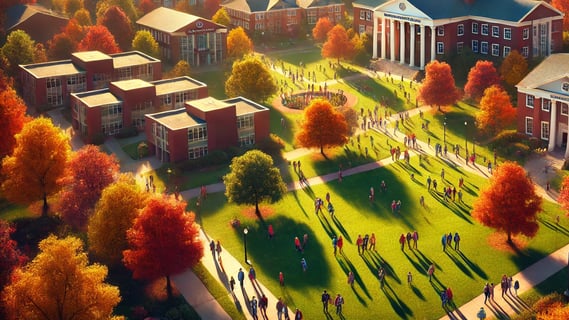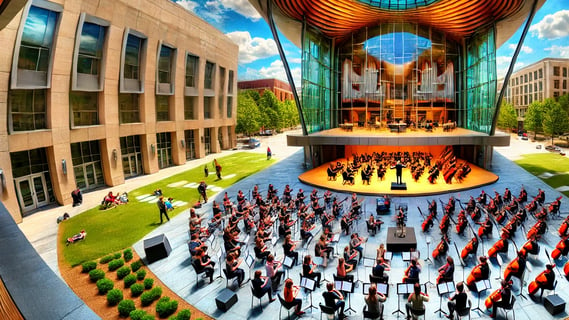Education’s Impact on Winston-Salem’s Economy
Explore the significant impact of educational institutions on Winston-Salem’s economy, including workforce development, research, and cultural influence.
FORSYTH COUNTYECONOMYWINSTON-SALEM
George
8/14/20245 min read


Education’s Impact on Winston-Salem’s Economy
Education is a cornerstone of Winston-Salem's economy, playing a crucial role in driving innovation, fostering community development, and shaping the workforce. The city's prominent educational institutions contribute significantly to the local economy through job creation, research initiatives, and cultural activities. This article delves into the multifaceted impact of education on Winston-Salem’s economic landscape.
Key Takeaways
Overview of major educational institutions in Winston-Salem.
Economic contributions and workforce development facilitated by these institutions.
The role of research and innovation in driving economic growth.
Influence on community and cultural life.
Wake Forest University
Wake Forest University is a pivotal institution in Winston-Salem, known for its rigorous academic programs and significant research initiatives. Established in 1834, the university has a rich history and a strong reputation for excellence. It offers a wide range of undergraduate, graduate, and professional programs, fostering a vibrant academic community. The university’s contributions to the local economy are substantial, providing employment to thousands and generating economic activity through its operations and student spending. Wake Forest is also a hub for research, receiving substantial grants and fostering innovation through partnerships with industry and other academic institutions.
Major Educational Institutions in Winston-Salem
Winston-Salem State University (WSSU)
Winston-Salem State University, founded in 1892, is a historically black university with a mission to provide high-quality education and community engagement. WSSU offers a variety of programs, particularly in health sciences and liberal arts, which are designed to meet the needs of a diverse student body. The university plays a critical role in workforce development, preparing students for careers in various fields and supporting the local economy through employment and community initiatives. WSSU's involvement in the local community is evident through numerous outreach programs and partnerships that enhance both the university and the city.


Salem College
Salem College, one of the oldest women’s colleges in the United States, offers unique programs and a close-knit academic environment. With a focus on liberal arts education, Salem College provides students with a broad educational foundation and fosters leadership and critical thinking skills. The college contributes to the local economy not only through direct employment but also by attracting students and visitors to the area. Salem College's commitment to community service and cultural engagement further enriches the Winston-Salem community.
University of North Carolina School of the Arts (UNCSA)
The University of North Carolina School of the Arts specializes in training talented individuals in various performing arts disciplines. Established in 1963, UNCSA has made a significant impact on both the local economy and the cultural landscape of Winston-Salem. The institution offers rigorous programs in music, dance, drama, filmmaking, and design, producing graduates who excel in their fields. UNCSA’s performances, events, and collaborations with local arts organizations enhance the cultural vibrancy of the city and contribute to the economy through tourism and community engagement.




Employment and Workforce Development
Educational institutions are major employers in Winston-Salem, providing jobs to faculty, staff, and support personnel. This employment generates significant economic activity, as employees spend their earnings locally on goods and services. Moreover, universities and colleges play a crucial role in workforce development, offering training and skill development programs that prepare students for careers in various industries. These institutions often collaborate with local businesses and industries to align educational programs with workforce needs, ensuring that graduates are well-equipped to contribute to the local economy.
Education's Economic Contributions to Winston-Salem


Research and Innovation
Research conducted at Winston-Salem’s educational institutions drives innovation and economic growth. Universities like Wake Forest and WSSU receive substantial research grants and engage in partnerships that advance knowledge and technology. These research activities often lead to the development of new technologies and products, which can be commercialized through technology transfer and startup incubation. The presence of research institutions attracts investment and talent to the region, further enhancing the local economy.
Community and Cultural Influence
Educational institutions serve as cultural hubs, hosting public events, lectures, and performances that enrich the community. Universities like UNCSA and Salem College play a significant role in the local arts scene, offering performances and exhibitions that attract visitors and foster cultural engagement. These activities not only enhance the quality of life for residents but also generate economic benefits through tourism and community participation.
Expansion and Infrastructure Projects
Winston-Salem’s educational institutions are continuously expanding and improving their facilities. Current and planned infrastructure projects, such as new academic buildings, research centers, and student housing, contribute to local economic development. These expansions create construction jobs and increase the capacity of institutions to serve more students, thereby generating additional economic activity.
Educational Partnerships
Collaboration with local schools, community colleges, and industry partners is a key strategy for Winston-Salem’s educational institutions. These partnerships enhance educational opportunities, support workforce development, and drive economic growth. Joint research initiatives and internship programs provide students with real-world experience and foster innovation through collaborative efforts.
Future Outlook and Development in Winston-Salem
Challenges and Opportunities
While educational institutions in Winston-Salem contribute significantly to the local economy, they also face challenges such as addressing educational disparities and adapting to changing workforce needs. Opportunities for growth and development include expanding access to education, enhancing research capabilities, and leveraging technology to improve educational outcomes. Strategies for enhancing economic impact include fostering stronger industry partnerships, increasing community engagement, and investing in infrastructure and innovation.






This article highlights the significant impact of educational institutions on Winston-Salem’s economy, showcasing their role in workforce development, research, and cultural engagement. Understanding these contributions provides valuable insights into the economic and social fabric of Winston-Salem, emphasizing the importance of education in the city’s ongoing growth and development.


